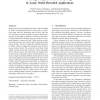Free Online Productivity Tools
i2Speak
i2Symbol
i2OCR
iTex2Img
iWeb2Print
iWeb2Shot
i2Type
iPdf2Split
iPdf2Merge
i2Bopomofo
i2Arabic
i2Style
i2Image
i2PDF
iLatex2Rtf
Sci2ools
143
Voted
EUROSYS
2011
ACM
2011
ACM
Finding complex concurrency bugs in large multi-threaded applications
Parallel software is increasingly necessary to take advantage of multi-core architectures, but it is also prone to concurrency bugs which are particularly hard to avoid, find, and fix, since their occurrence depends on specific thread interleavings. In this paper we propose a concurrency bug detector that automatically identifies when an execution of a program triggers a concurrency bug. Unlike previous concurrency bug detectors, we are able to find two particularly hard classes of bugs. The first are bugs that manifest themselves by subtle violation of application semantics, such as returning an incorrect result. The second are latent bugs, which silently corrupt internal data structures, and are especially hard to detect because when these bugs are triggered they do not become immediately visible. PIKE detects these concurrency bugs by checking both the output and the internal state of the application for linearizability at the level of user requests. This paper presents this ...
Application Semantics | EUROSYS 2011 | Incorrect Error | Internal Data Structures | Software Engineering |
Related Content
| Added | 28 Aug 2011 |
| Updated | 28 Aug 2011 |
| Type | Journal |
| Year | 2011 |
| Where | EUROSYS |
| Authors | Pedro Fonseca, Cheng Li, Rodrigo Rodrigues |
Comments (0)

